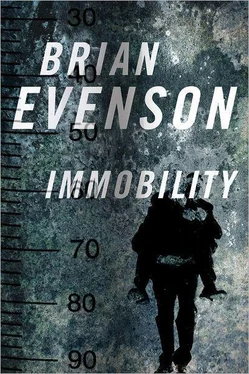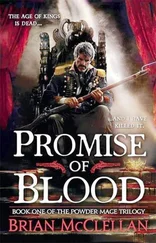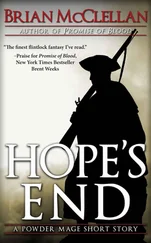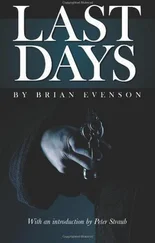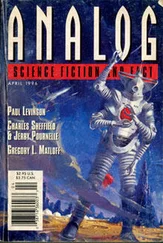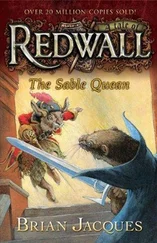“But your mind wasn’t affected,” said Olaf.
“You were fine,” Rasmus admitted. “You seemed to be doing all right.” He looked down at his hands. “Had this happened now instead of then, you would have been in trouble. You would have been decapitated or burned. But my father wasn’t superstitious.”
“There were explanations,” said Olaf.
“Science can explain anything,” said Oleg.
“Or could,” brooded Rasmus. “Nowadays, who knows? Science doesn’t really exist anymore, at least not like it used to. It was designed not for this world but the world before it.” Rasmus grabbed hold of the chair’s arms, straightened up. “Where were we?” he asked. “Oh, yes. In time you seemed fine, okay, as impossible as that was. But even early on there were slight signs, nervous twitches, moments when you stumbled, when you lost feeling in your feet and toes.” He looked again at Horkai. “I learned this all secondhand, of course.”
“You can’t blame him if he has some of the details wrong,” said Olaf.
“It’s been thirty years, after all,” said Oleg.
“Shut up,” said Rasmus, turning to them. “You both talk too much.” He turned back to Horkai. “Does any of this ring a bell?” he said.
Horkai thought. Did it? No. The past was a blur, hard to make out. But, ever cautious, he nodded.
“I wasn’t there,” said Rasmus again. “Don’t blame me if a few of the details are a little off. And above all, don’t blame the messenger,” said Rasmus. He licked his lips. “There’s one more thing,” he said. “You survived a blast that you shouldn’t have survived, but you’re suffering from a degenerative disease. It started with tingling and numbness in your toes and then progressed to an absence of feeling in your feet. Then you lost control of your feet. Slowly it crept up your legs. Eventually you’ll be completely paralyzed, suffering from utter immobility.”
“Why was I stored?” he asked.
“For protection,” said Oleg.
“To save you,” said Olaf quickly.
“That’s right,” said Rasmus. “We’ve been storing you, for your own good, to save you from being paralyzed. We’ve kept you stored, waiting to make some progress toward curing you. Before we thought of storing you, we gave you injections in the spine to slow the progress of the nervous degeneration. It’s a necessary process, but also painful.”
“Exceptionally painful,” said Olaf.
“It couldn’t hurt more,” said Oleg.
“I’m afraid,” said Rasmus, “that for your own good we’ll have to give you an injection soon.”
Then there was silence, Rasmus waiting, staring expectantly at him.
“You’ve woken me up because you’ve found the cure?” asked Horkai.
The two brothers laughed.
“Not exactly,” said Rasmus. “I wish we had, Josef. I really do.”
“Then why wake me up at all?”
“Because we need you,” said Olaf.
“We have a problem,” said Oleg.
“There’s something we need you to do,” said Rasmus.
“What?”
“All in good time,” said Rasmus. “But first things first. He reached into his pocket, came out with a syringe. He broke the plastic casing off the needle. “I hate to do this, but it’s necessary. Let’s get it over with.”
* * *
BEFORE HE REALLY UNDERSTOOD what was happening, Olaf and Oleg each had him by an arm and had dragged him from the chair to fold him over the desk, pushing his face down flat against it. Rasmus’s hand was groping at his back, dragging up his shirt.
He felt a sharp stab of pain in the center of his spine; then Rasmus said, “We’re in.” A pressure began to build, which translated into flickers of pain running up and down his spine and growing stronger and suddenly bursting in his mind. And then he was screaming, bellowing into the desk’s metal top. Crazed with pain, he managed to get his hands under him and pushed off with all his might. The brothers were crying out now, hanging on to him as he was clutching at them to keep from falling, twisting between them. He caught a glimpse of Rasmus, a frightened expression on his face, the syringe hanging in his hand, its needle discolored with blood. He struck out once with his forehead and broke Oleg’s nose, then again in the other direction and both brothers collapsed, leaving him with nothing to hold on to. He came down hard and lay writhing on the floor.
* * *
IN TIME THE PAIN FADED. He lay there exhausted, panting. Rasmus was pressed against one wall, unhurt, looking down at him but keeping a safe distance. Oleg lay groaning and slumped on the floor, holding his face, blood oozing through the gaps of his fingers. Olaf was unconscious, a dark bruise already starting to show on one side of his face.
“I warned you it would hurt,” said Rasmus in the same tone one might use to scold a child.
“Seems like it might have hurt them almost as much as it hurt me,” said Horkai, trying to keep the pain out of his voice.
“He’s a monster,” whined Oleg, his voice muffled through his hand. “We shouldn’t have woken him.” It was strange for once not having one brother speaking immediately after the other.
“Hush,” said Rasmus. “He didn’t mean anything by it,” he said. “He just didn’t know his own strength. It was the pain that did it, not him. Aren’t I right, Josef?”
“Probably,” said Horkai. He pushed his splayed legs straight, started to drag himself back to the wall.
“There’s no reason to be like that,” said Rasmus. “We’re on your side, Josef.”
“And what side is that?”
“The good guys,” said Rasmus, and offered his toothiest smile. “We’re the good guys.”
Olaf was groaning now. His brother crouched over him, shaking him slightly, dribbling blood on him.
“All for the good of the cause,” said Rasmus, following his gaze. “Though let’s try not to have the same thing happen next injection, hmmm?”
But Horkai didn’t answer. He was busy thinking. When he finally did speak, it was to ask, “If I’m really paralyzed from the waist down, why did I feel that in my legs?”
Rasmus just held his gaze. “You didn’t,” he claimed at last. “You just think you did.”
YOU DIDN’T. YOU JUST THINK you did.
They had left him alone in a room with a bed and little else. He was lying there in the dim light, trying but failing to fall asleep. You didn’t. You just think you did. Either Rasmus was telling the truth or he was lying. But he didn’t know Rasmus well enough to be able to read him properly.
If he was lying, it meant that he, Horkai, had actually felt something, that there was some feeling left somewhere in his legs. That might mean the nerves could be repaired, that there was hope he might regain his ability to walk. Or it might simply mean that though the legs were paralyzed, the paralysis was not as extensive as Rasmus had been led to believe, that Rasmus wasn’t so much lying as simply unaware. Which wasn’t to say that Horkai’s immobility wasn’t progressing, that he wouldn’t lose, as Rasmus said, more and more feeling and finally become completely paralyzed. Only that it hadn’t progressed as far as Rasmus believed.
So, one hopeful and one not-so-hopeful possibility. But if Rasmus was right and he hadn’t felt anything, though, it was more discouraging. It meant he couldn’t trust his own senses, couldn’t trust what he was feeling and, by extension, couldn’t trust what was going on in his own mind. The mind is a great deceiver. He might be experiencing a feeling that was real and he might not be—how exactly was he to know? Which ultimately made him wonder if the whole of his reality wasn’t suspect. Was there anything he could know for certain?
Читать дальше
